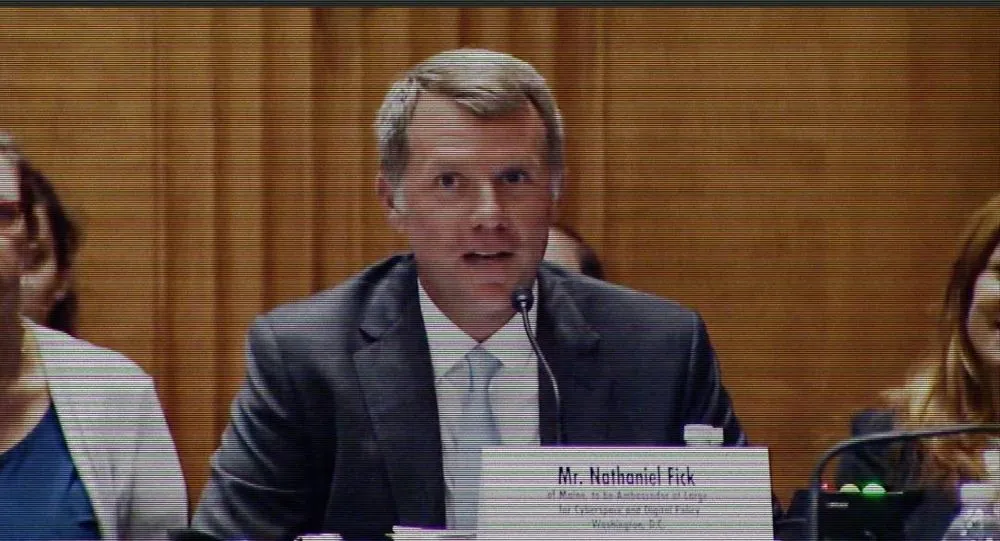US cyberspace ambassador nominee lays out ambitious agenda
Cyberspace may not be a physical place, but it’s where the fallout of many international engagements now play out – and it may have a U.S. ambassador soon.
The Biden administration’s nominee to be the first U.S. “Ambassador at Large for Cyberspace and Digital Policy” at the Department of State, Nathaniel Fick, faced questions from the Senate Foreign Affairs Committee Wednesday — setting a wide-ranging agenda if confirmed.
Cyberspace is “the next frontier of American diplomacy,” Fick, a former Marine who now leads cybersecurity efforts at software firm Elastic, told the committee. “Our future will be shaped by the infrastructure, standards, norms, and policies that determine how digital technologies are developed, deployed, and used.”
Fick laid out prospective policy priorities in opening testimony, plus how he would approach important issues from an operational standpoint.
On the policy front, Fick said he would seek to “strengthen adherence to the framework of responsible state behavior” outlined by the United Nations when it comes to malicious behavior online, promoting a norm-based model to deter bad behavior. He also said he would promote a digital economy where U.S. companies and the people that work at them can compete — including protecting the free flow of data across borders while protecting user’s privacy and the integrity of their information. Lastly, Fick said he would “champion a positive vision for digital freedom” that countered a rise in digital authoritarianism.
To pursue those policies, he planned to focus first on building a team and culture inside the State Department that views fluency and expertise in technology as a crucial skill set. After that, he would focus on asserting the State Department’s place in cybersecurity policy, as well as other global digital security issues.
‘Tool of first resort’
Chief among those challenges, according to Fick, are issues raised by the Russian invasion of Ukraine and the U.S.’s ongoing strategic competition with China.
Senator Rob Portman (R., Ohio) questioned Fick on how he would carve out the agency’s role in what he suggested was an increasingly crowded federal cybersecurity space — including coordinating with the White House National Cyber Director, Cybersecurity and Infrastructure Security Agency (CISA), and other stakeholders.
“I believe diplomacy should be our tool of first resort,” Fick responded, adding that he views the ambassador role as filling “an important gap” by prioritizing a diplomatic approach to cybersecurity and other digital policy challenges.
Fick also cited his past experience in the military and the private sector as evidence he would be able negotiate appropriate channels of responsibility. Fick served combat tours with the Marines Corps in Afghanistan and Iraq after graduating college before attending graduate school at Harvard, then working at the think tank the Center for a New American Security and in the cybersecurity industry.
Ahead of the hearing, CyberScoop reported on a letter from a bipartisan group of more than 100 national security and cybersecurity experts urging for Fick’s rapid confirmation.
“The new ambassador will need the ability to build diverse sets of economic, military, and political coalitions to advance our national interests and help protect our nation in the cyber domain,” the group wrote. “We believe [Fick] can bring the right combination of skills to bear on the important work of building bridges across borders, and with private industry as well, and can likewise help our government get tough on its adversaries as we seek to establish real deterrence in cyberspace.”
The Committee will vote on whether to advance Fick’s nomination to the full Senate at a future meeting.
If confirmed by the full body, Fick will lead the State Department’s Bureau of Cyberspace and Digital Policy. The Bureau was established as part of Secretary Antony Blinken’s reorganization of the department and has been in operation since April.
Although the Ambassador role is new, the State Department has a long history of engagement on issues related to the online world. For example, during her tenure as Secretary, Hillary Clinton’s signature policy was digital diplomacy — a key component of which was funding for secure communication tools.
Andrea Peterson
(they/them) is a longtime cybersecurity journalist who cut their teeth covering technology policy at ThinkProgress (RIP) and The Washington Post before doing deep-dive public records investigations at the Project on Government Oversight and American Oversight.



